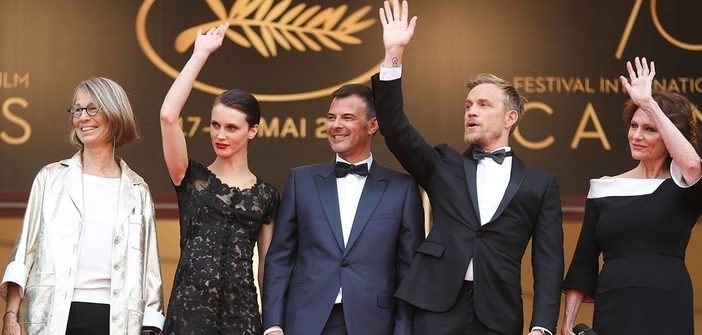Final stretch before Saturday’s conclusion with films pouring in (an American, a Ukrainian, a German, and the last, French, one by Ozon) and the feeling that despite a respectable selection, this 70th Festival won’t be a great vintage year.
Good Time, Josh and Benny Safdie (USA)
Two brothers, one of whom is mentally challenged, commit a robbery that goes wrong. The mentally challenged Nick gets arrested, and Connie tries to break him out. In the underbelly of New York, a night full of twists and turns begins.
A bit in the spirit of Scorsese’s After Hours, the hero (Robert Pattinson) makes a series of blunders and proves to be not much more competent than his simple-minded brother. The film has a good pace and is sometimes amusing but remains within the confines of a somewhat ordinary genre film suited for viewing at the beach cinema during vacations.
A Gentle Creature (Krotkaya), Sergei Loznitsa (Ukraine)
A woman receives the package she sent some time earlier to her imprisoned husband. Worried, she decides to go to the prison in a very remote region of Russia to obtain information. Once there, she begins a long ordeal where she will be jostled, humiliated, and threatened.
Krotkaya is the intense version of the film Nelyubov presented on the festival’s first day. In both cases, the goal is to provide an X-ray of Russia, suffering more than ever from the remnants of communism while wallowing in the most obtuse nationalism. Loznitsa’s film starts like an extensive hidden-camera documentary on the post-Stalinist bureaucracy still in place at the edges of the Empire where this prison is located. “The Gentle Creature” will be a witness before becoming a victim. Then the film shifts into surrealism during a long, somewhat hallucinatory scene (between Fellini and David Lynch in style), where one understands the complexity and roots of this Russian nationalism that justifies all authoritarian excesses, turning victims into their own executioners, true children of Putin.
Contemporary Russia cannot emerge unscathed from this festival: a (or both?) Russian film should be recognized.
In the Fade, Fatih Akin (Germany)
Katia, a native German, marries a German of Kurdish origin while he is still in prison for drug trafficking. A few years later, the couple lives a peaceful life between business activities and family life. But her husband and young son fall victim to an attack perpetrated by the far right. After mourning and injustice, it’s time for revenge.
A filmmaker of German-Turkish origin, Fatih Akin goes beyond merely denouncing racist crimes in Germany to offer us a film full of twists, with a heroine (a convincing Diane Kruger) who, after hesitating between trust in justice and personal vendetta, opts for a third way that surprises the viewer.
A small note, however: the very real far-right terrorism may not be the most dangerous for our democracies at present. One might wonder why the festival, which regularly prides itself on being the mirror of the world, didn’t present any films dealing with Islamic terrorism. Politically correct self-censorship?
The Double Lover, François Ozon (France)
Chloé, a fragile young woman, falls in love with her psychotherapist, Paul. A few months later, they move in together, but she discovers that her lover has hidden part of his identity from her.
François Ozon delivers a completely unexpected film with surprising tonal shifts and a startling finale (don’t discuss it with those who haven’t seen the film, avoid trailers). An opportunity to see Jacqueline Bisset alongside the stunning lead actors, Marine Vacth and Jérémie Renier.
by Patrick Mottard


